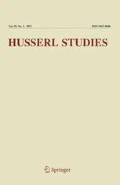Notes
In part this is owing to his pronounced reliance on the schema of “two Husserls” (p. 105, p. 110, p. 114n37). I myself have elsewhere argued that this schema is neither itself persuasive nor solves the problem which it purports to address (Kates 2005a, p. 61).
What came to be called the Zahavi/Brough debate focused on the question of whether three or only two distinct levels of consciousness should be identified in Husserl’s analyses of time. See Husserl Studies (2011) 27:1–12, 13–25, and 27–40 for DeRoo’s, Zahavi’s, and Brough’s discussion of this question.
For the former see Derrida (1990, pp. 120–21); and cf. Kates (2005b, pp. 100ff); for the latter, note Derrida’s insistence that “every critique (that, notably, of Heidegger and Tran Duc Thao) […] tends to a radical reversal of which one does not see that it assumes the problematic defined and resolved by Husserl” (Derrida 1990, p. 226; my translation).
See Kates (2005b, pp. 83–114) for an account of the development of Derrida’s early thought, as well as why Derrida did not in fact publish PG at the time he composed it. DeRoo, by contrast, places all the early works on the same footing, with the exception of “Violence and Metaphysics” which, according to him, offers “a more positive elaboration of Husserl than is found in The Problem of Genesis, the Introduction, or Speech and Phenomena” (p. 105).
DeRoo at times speaks of Derrida not simply as placing Levinas on one side and Husserl on the other, but as charting a problematic that “will cut through the work of both of these figures” (p. 114). Yet owing to setting up his treatment as so described, affirming PG as “set(ting) Derrida on a Levinasian path,” which is then “supplemented” by the alternative view of “Violence and Metaphysics” (p. 105), DeRoo’s actual analyses rarely get beyond such an alternation, as his treatment of “double necessities” will further confirm (p. 107).
Interrogating the type of evidence accruing to the Idea’s own givenness, Derrida indeed argues that since the infinite so presented can never be given in its own right, an irreducible absence—including of all persons and of the subject itself—and thus a radical finitude, co-opens every intentionality and all relations to objects corresponding to the infinity of rationality. DeRoo, however, in one of his rare misreadings, discussing différance, tellingly assigns (as if by fiat) just this absence at the source of all evidence and objectivity to the Levinasian Other (“as such, sense goes to the relation with the other person”) (p. 117).
DeRoo himself does not explicitly label all of these double necessities, but since he repeatedly ties the later oppositions back to those he has previously designated such, it seems fair to expand his categorization.
Noting that his oppositions would “seem to reverse the previous order,” DeRoo will go on to distinguish Derrida’s messianicity from “a structural formalism of a Kantian type” (p. 124). As pointed out above, however, Derrida’s notion of a telos, though invoking a Kantian idea, is thoroughly Husserlian—and by no means finally structuralist, as interpreted by Derrida in the late work—so DeRoo’s attempt at a correction never gets to the heart of the matter. Moreover, that DeRoo here glosses Derrida as speaking of the priority of presence as a “choice” that is originally “historical and empirical with transcendental consequences” shows that the aforementioned incoherencies in respect to history remain (p. 125).
References
Derrida, J. (1990). Le Problème de la genèse dans la philosophie de Husserl. Paris: Presses Universitaires de France.
Derrida, J. (1994). Specters of Marx: The state of the debt, the work of mourning, and the new international. New York: Routledge.
Derrida, J. (2000). Et cetera… in Deconstructions: A user’s guide (pp. 282–305). N. Royle (Ed.). New York: Routledge.
Kates, J. (2005a). Review of Leonard Lawlor, Derrida and Husserl: The basic problem of phenomenology. Husserl Studies, 21.1 (April): 55–64.
Kates, J. (2005b). Essential history: Jacques Derrida and the development of deconstruction. Evanston: Northwestern University Press.
Author information
Authors and Affiliations
Corresponding author
Rights and permissions
About this article
Cite this article
Kates, J. Neal DeRoo: Futurity in Phenomenology: Promise and Method in Husserl, Levinas, and Derrida . Husserl Stud 31, 81–88 (2015). https://doi.org/10.1007/s10743-014-9154-0
Published:
Issue Date:
DOI: https://doi.org/10.1007/s10743-014-9154-0

